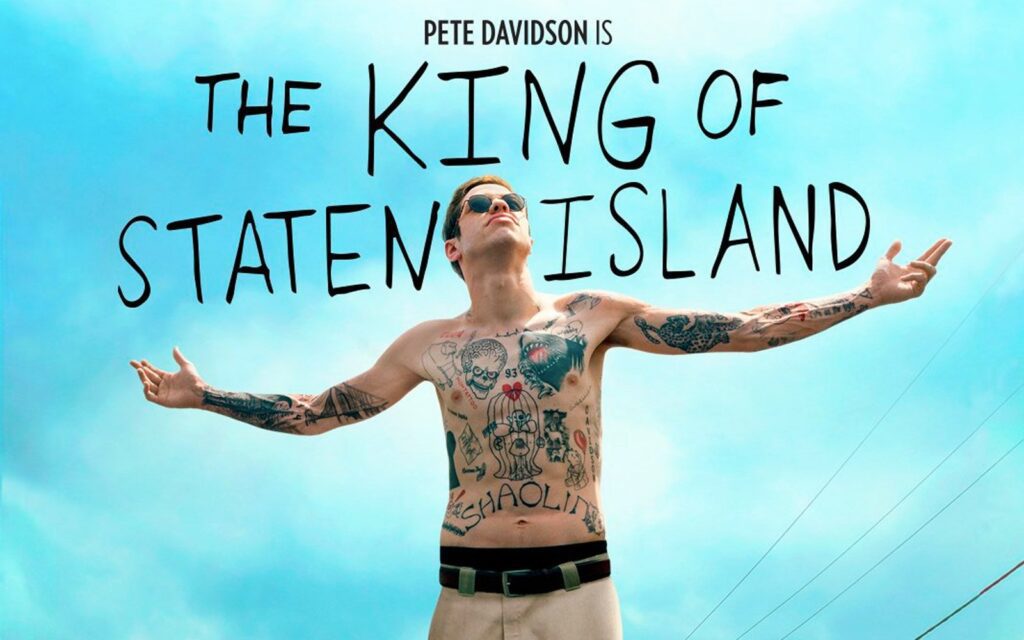Summary
In Judd Apatow’s newest film, Scott (Pete Davidson) smokes his way aimlessly through life, dragging down those around him until his mother (Marissa Tomei) kicks him out and forces him to get a grip on his life’s direction.
The King of Staten Island director Judd Apatow (Knocked Up, Trainwreck, The 40-Year-Old Virgin) has long been the king of the stunted, aimless man-child, and because I discovered his movies as I was just getting into college – a stunted man-child myself – they resonated with me. His original muses were the Pot Pack: Seth Rogan, Jonah Hill, Paul Rudd, Jason Segal, Martin Starr, Jay Baruchel, and a plethora of up and coming comedians whom Apatow essentially thrust into stardom. He’s made a career of being behind the camera of some of the greats. Rogen and Segal and Rudd work as lovable potheads trying to figure out life because they’ve got a real heart at their core, something that innately redeems what others would see, on the surface, as unredeemable.
With Pete Davidson’s Scott, Apatow builds in his most difficult challenge: a character who doesn’t allow you to sift through the junkie haze and grab onto him as a character. He’s dealing with a plethora of physical and mental disorders – many of which he may just play up to get out of doing anything worthwhile – and he’s chronically unlikable. He’s just not lovable. In fact, he’s openly hostile at the prospect of any affection or human connection of any kind. He actively shuns it from the start, even relishing in the aura of disdain and disappointment and chronic Millennial “it’s not my fault”-ness. What Apatow usually plays for a laugh, he plays straight here. It doesn’t fall flat, though – it begs scrutiny and conversation.

Pete Davidson may or may not rise to the heights of the Oscar-nominated Jonah Hill or the prolificacy of Seth Rogan, but he’s exactly what Apatow needed to make an even more mature film than he’s done before. He turns in a performance that authentically goes from sh*t-eating basement-dweller to a guy on the way to trying to righting the wayward ship that is his life. This is a feat – I started the film just not liking Scott, unsure if it’s Davidson’s performance or the character himself, though I suspect that there are thinly veiled biographical details here (as Apatow has long been wont to utilize in his films) that ground Davidson’s Scott in reality. Scott’s story isn’t sensationalized for comedic effect or smoothed out with a series of improvised one-liners; there are funny moments, to be sure, but the humor is a lining for the dark, brooding cloud that is his life, and some things, as they say, you just can’t make up.
With The King of Staten Island, Apatow laser focuses in on the discussion that’s been in our cultural zeitgeist, that he’s poked fun at in a loving way before, but that he now wants to zero in on: this stereotypical lives-in-his-mom’s-basement-and-has-no-ambitions Millennial. We don’t see our unemployed protagonist living in an amazingly, literally unbelievably unaffordable house in LA as in Knocked Up – life doesn’t really work that way. His drug-den basement is nasty – not romanticized. There’s even a scene in which Scott and his friends gripe about “those Millennials” before one of them realizes they are Millennials. Never before has a generation been as scrutinized, dissected, bashed, and condescended to, and Apatow focuses on the heart and trauma that epitomizes the experience of many of my generation.
Does Judd Apatow solve all of our problems with The King of Staten Island? Not necessarily. This isn’t an easy film. It’s not a quick one, either – Apatow regularly clocks in at over two hours for his dramedies, and this is no exception. It could be trimmed by about thirty minutes. However, this one almost earns the length (for the most part), the discussion, the debates that this will raise, particularly in the final act. It boasts an excellent supporting cast: from Marisa Tomei and Bill Burr to the amazing Bel Powley, Maude Apatow, and Steve Buscemi, each of whom gives it their all. Consequently, it’s much more grounded and raw than his previous stoner post-adolescent comedies, and while it doesn’t surmount the lofty bar of those classics, it’s worth digesting and discussing all the same.



